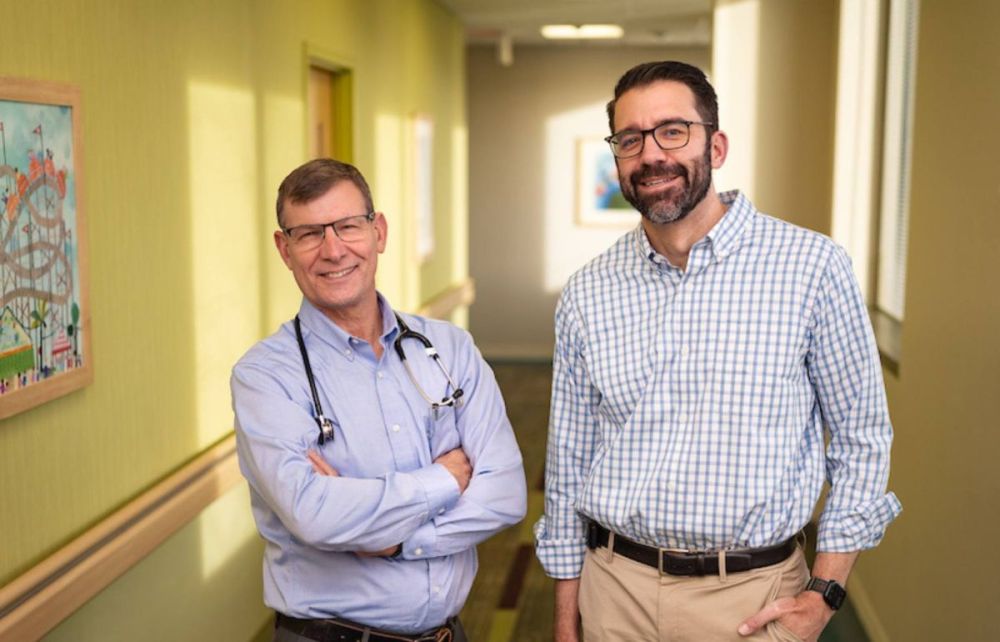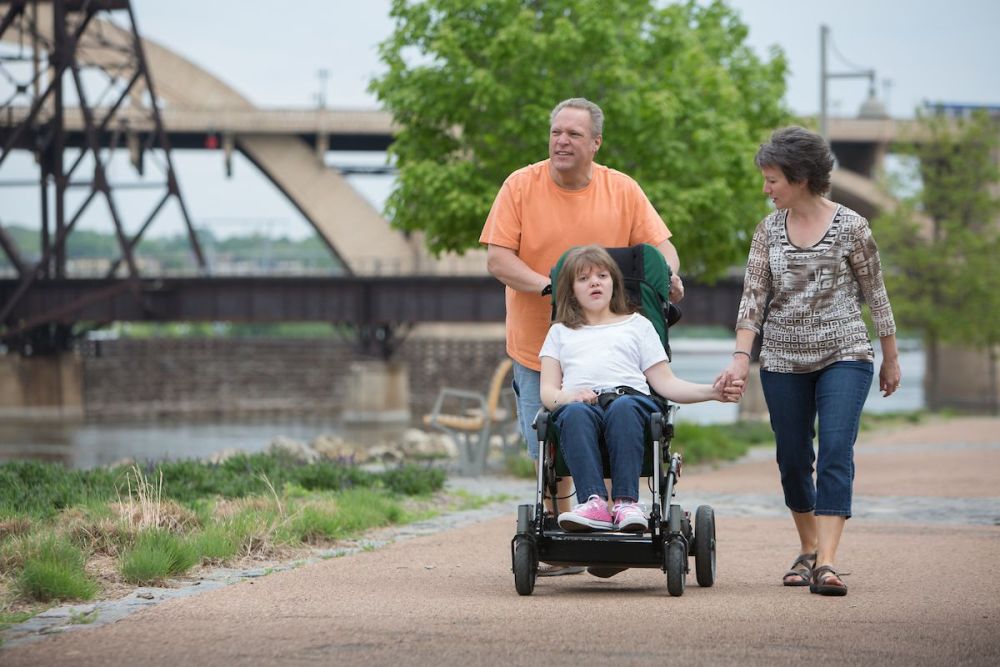“Any true development in the treatment of rare disease is usually sparked by a parent,” says Gillette Children’s complex care pediatrician, Arthur Beisang, MD.
Parents were instrumental in the first FDA-approved treatment, Daybue (trofinetide), to help patients diagnosed with Rett syndrome. Rett syndrome is a rare, neurological disorder that affects growth and development. Most infants with Rett syndrome are girls who appear to develop typically until age 2 or 3. Children will stop gaining developmental skills, such as walking or talking and might lose skills they had achieved.

Lisa Evert considers Gillette providers, Art Beisang, MD and Tim Feyma, MD "honorary members" of her family.
The debut of Daybue--a treatment for Rett
About 50 Gillette patients diagnosed with Rett syndrome have been taking Daybue for the past year and have shown improvement in their communication skills, breathing, and overall quality of life.
Gillette is one of 18 institutions across the U.S. that is designated as a Center of Excellence by the International Rett Syndrome Foundation (IRSF).
Dr. Beisang and pediatric neurologist, Tim Feyma, MD, co-direct the Gillette Children’s Rett Syndrome Center of Excellence. They credit parents with helping to advance treatments for rare diseases. They say the work done by Lisa Evert, the Midwest Rett Foundation, and parents were key to providing hope and pressure for new treatments such as Daybue.
Lisa Evert recently stepped down as the president of the Midwest Rett Foundation. Her daughter Jill was born in September 1997 and diagnosed with Rett in 1999. She calls Dr. Beisang and Dr. Feyma “honorary members of her family” and says her organization raised over $750,000 to help find treatments for Rett. She shares advice on being an advocate for your child and treating a rare disease.
Lisa, how can parents or caregivers advocate for their child diagnosed with a rare disease or health condition?
Parents need to understand the diagnosis and how it impacts their child. Children with the same diagnosis can still vary greatly with how it impacts them day to day.
Record daily events on a calendar to show trends, normal periods, flare-ups and mysteries.
Find a local/primary care doctor in your hometown to bond with for ‘easy’ medical needs.
Build a strong relationship with the doctors who specialize in your child’s diagnosis.
Never forget that the parent’s voice is the strongest and it matters immensely. Utilize parent networks within your child’s diagnosis. This support can guide you through the worst of times.
When something seems ‘off’, act on it. Be prepared that local clinics and hospitals will be quickly overwhelmed by your child’s complex needs.
YOUR VOICE MATTERS. Get second opinions and use specialists every chance you get.
Our experience with having the Rett syndrome clinic at Gillette has been invaluable in getting through the past 24 years since Jill’s diagnosis. Now that Jill is 26, we have been using additional providers via the Lifetime Clinic. This has been wonderful in that we have continued care, specialized care, well into adulthood.
Rare disease and research go hand in hand. Parents need to engage in research to truly move it forward. Families need to strongly consider every survey, clinical trial, pilot program or whatever comes their way. I believe families should take action whenever possible.
What do you wish you could tell your younger self about being an advocate for your child?
Having a child with a complex disorder will consume your life, both in good and bad ways.
It will bring unique rewards and appreciation for things that other families will never understand.
Take care of your own health, dig in and educate yourself on the disorder, but recognize and enjoy the good times.
Be ready to truly find BALANCE in your life as it is a long haul. It will seem overwhelming, and it is, but find balance.

The Evert family walking along a path in St. Paul, MN. Lisa Evert says it is important to find balance in your life while caring for a child who has complex medical needs.
What is the hardest part of being the parent of a child diagnosed with a rare disease?
Life gets harder, not easier, as complex children become complex adults. The parents age too and get tired!
The biggest unknown and fear I have is not knowing who will care for her or where she will live once I cannot be the primary care provider. It is overwhelming and frightening and something I think about every day. It is the biggest problem to solve of my life, yet the one problem I have no solution for as I don’t know when that day will come. Will she pass away before me? Will I have my own health crisis at a young age? Many care options today, outside the home, are of poor quality and not an acceptable solution for our family right now.
Rett syndrome comes with little to no reliable communication with your child. This has been very difficult to deal with as it plays into medical problems not being diagnosed in a timely manner.
It’s devastating, as a parent, to have someone in your life every day and who you love more than any other person on earth, yet you have never had a two-way conversation or any real insight into their thinking, needs, desires.
My daughter, Jill, could not tell us what she wanted for her birthday, she could not tell us where it hurts while tears fill her eyes, she could not express loss when close relatives have passed away and she no longer sees them.
What is the best/most gratifying part of being a parent of a child diagnosed with a rare disease?
I can still snuggle on the couch with my adult child, and she LOVES it. We continue to experience life very differently from most because we are not caught up in typical life stresses/worries: dating, drugs, alcohol, social media harm, going to college, moving out etc. It is a relief to not have those things in our life.
Lisa Evert is the former president of the Midwest Rett Foundation.
Gillette offers expert rare disease care
Gillette is an international leader in rare disease care. If you have a child diagnosed with Rett or another rare disease, the Gillette experts are available for evaluations, care, and support. Gillette brings together experts from different areas to take care of your child’s needs, often during the same visit. Click here to learn more about rare disease care at Gillette.
 Home Page
Home Page

